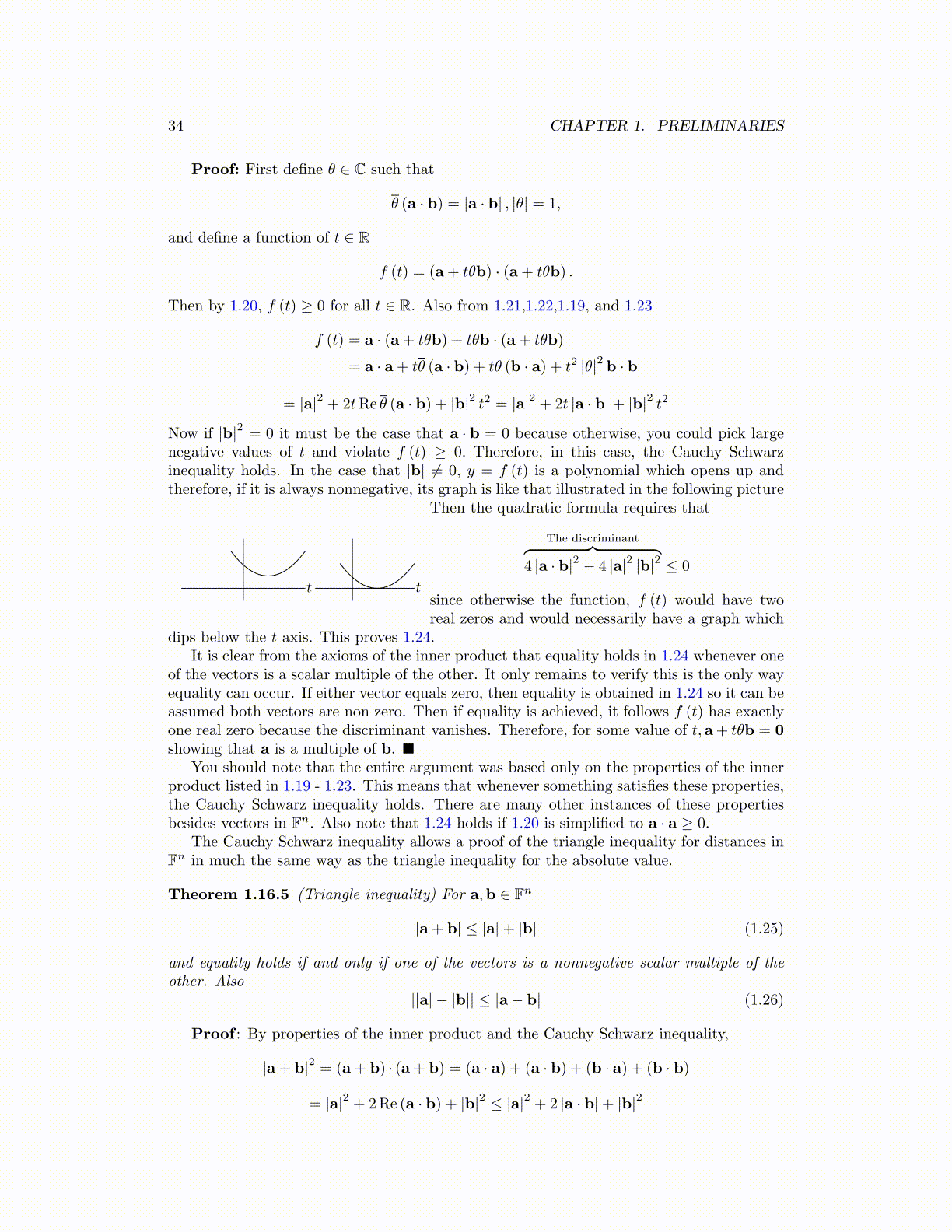
34 CHAPTER 1. PRELIMINARIES
Proof: First define θ ∈ C such that
θ (a · b) = |a · b| , |θ| = 1,
and define a function of t ∈ R
f (t) = (a+ tθb) · (a+ tθb) .
Then by 1.20, f (t) ≥ 0 for all t ∈ R. Also from 1.21,1.22,1.19, and 1.23
f (t) = a · (a+ tθb) + tθb · (a+ tθb)
= a · a+ tθ (a · b) + tθ (b · a) + t2 |θ|2 b · b
= |a|2 + 2tRe θ (a · b) + |b|2 t2 = |a|2 + 2t |a · b|+ |b|2 t2
Now if |b|2 = 0 it must be the case that a · b = 0 because otherwise, you could pick largenegative values of t and violate f (t) ≥ 0. Therefore, in this case, the Cauchy Schwarzinequality holds. In the case that |b| ̸= 0, y = f (t) is a polynomial which opens up andtherefore, if it is always nonnegative, its graph is like that illustrated in the following picture
t t
Then the quadratic formula requires that
The discriminant︷ ︸︸ ︷4 |a · b|2 − 4 |a|2 |b|2 ≤ 0
since otherwise the function, f (t) would have tworeal zeros and would necessarily have a graph which
dips below the t axis. This proves 1.24.It is clear from the axioms of the inner product that equality holds in 1.24 whenever one
of the vectors is a scalar multiple of the other. It only remains to verify this is the only wayequality can occur. If either vector equals zero, then equality is obtained in 1.24 so it can beassumed both vectors are non zero. Then if equality is achieved, it follows f (t) has exactlyone real zero because the discriminant vanishes. Therefore, for some value of t,a+ tθb = 0showing that a is a multiple of b. ■
You should note that the entire argument was based only on the properties of the innerproduct listed in 1.19 - 1.23. This means that whenever something satisfies these properties,the Cauchy Schwarz inequality holds. There are many other instances of these propertiesbesides vectors in Fn. Also note that 1.24 holds if 1.20 is simplified to a · a ≥ 0.
The Cauchy Schwarz inequality allows a proof of the triangle inequality for distances inFn in much the same way as the triangle inequality for the absolute value.
Theorem 1.16.5 (Triangle inequality) For a,b ∈ Fn
|a+ b| ≤ |a|+ |b| (1.25)
and equality holds if and only if one of the vectors is a nonnegative scalar multiple of theother. Also
||a| − |b|| ≤ |a− b| (1.26)
Proof : By properties of the inner product and the Cauchy Schwarz inequality,
|a+ b|2 = (a+ b) · (a+ b) = (a · a) + (a · b) + (b · a) + (b · b)
= |a|2 + 2Re (a · b) + |b|2 ≤ |a|2 + 2 |a · b|+ |b|2